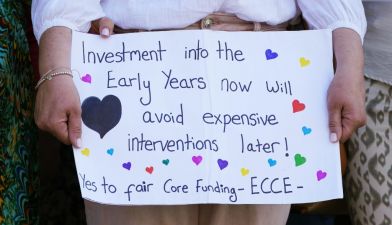Parents in Northern Ireland are more reliant on family and friends for childcare than those in the Republic, a study has found.
The research also indicates that a child’s home environment has a greater influence on their development than their participation in early childhood education and care (ECEC).
The Economic and Social Research Institute (Esri) carried out the study in partnership with the Shared Island Unit in the Department of the Taoiseach.
The study – based on survey data and interviews in both jurisdictions – compared early childhood services in the Republic and Northern Ireland.
Children in both jurisdictions are entitled to some hours of free pre-school care, with 15 hours in the Republic and 12.5 hours in Northern Ireland.
Some children in Northern Ireland get longer hours depending on services available locally.
The Esri study, published on Monday, found that mothers of young children in the Republic work longer and are more reliant on formal childcare, while in Northern Ireland, mothers are more likely to work part-time and are more reliant on friends and family.
In both jurisdictions, centre-based care is more common when mothers are employed and family income levels are higher.
The social background and home learning environment of a young child have a greater influence on their cognitive and emotional outcomes than attending early childhood education and care, it found.
Ireland and the UK are among the countries with the highest costs for full-time childcare in the Organisation for Economic Co-operation and Development, with similar affordability issues.
Policy efforts in both regions have attempted to reduce costs for families, with the Republic reducing the cost of childcare by 25 per cent in its last budget, and there is a strong suggestion there will be a further 25 per cent decrease in the next.
The Republic and Northern Ireland have low pay levels and staff retention issues for early-years staff, the study said.
The Esri said that while the pace of policy developments in the early years sector in the Republic has been rapid in recent years, referencing “substantial Government investment”, the collapsed power-sharing executive has resulted in Northern Ireland stakeholders expressing “frustration” over slow progress on policy.
“For example, extensions in the hours of universal pre-school provision have been implemented in the rest of the UK but not yet in Northern Ireland,” it said.
The research found “significant scope” for policy learning in both jurisdictions, referencing Northern Ireland’s Sure Start system for children in disadvantaged areas, Northern Ireland’s success in developing a formal system for childminders, and the Republic’s AIM programme for children with special educational needs.
One of the report authors, Dr Helen Russell, said: “High-quality services are essential to ensure that children benefit from early childhood education and care.
“Accessible and affordable childcare also impact on parents’ employment opportunities, particularly mothers.

“This study as part of the Shared Island research programme shows that childcare systems in Ireland and Northern Ireland can learn from each other in promoting quality and inclusivity.
“In both systems, there is further scope to improve the level of spending on young children in line with that in other wealthy countries and expand provision for children under three.
“The overall differences identified in childcare provision and the working patterns of women, Northern Ireland and Ireland, are also notable, with more reliance on formal provision in Ireland, and higher levels of part-time work by mothers of young children in Northern Ireland.”







